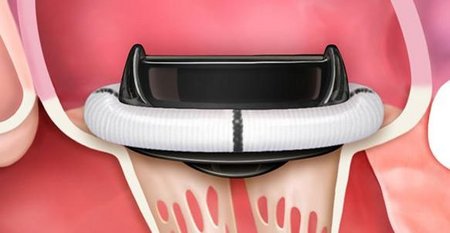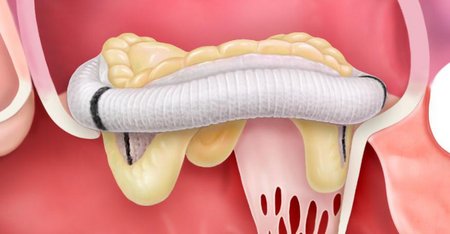MITRAL VALVE
REPLACEMENT
MITRAL VALVE REPLACEMENT IS A
TREATMENT OPTION FOR MITRAL REGURGITATION
If you’re diagnosed with a leaky heart valve and your mitral valve cannot be repaired, your doctor may recommend mitral valve replacement with an artificial (prosthetic) valve. Two types of prosthetic mitral valves are available: mechanical or tissue valves. Each type of valve offers different benefits and risks, depending on your specific needs.
Choosing between a
mechanical valve or a tissue valve

Mechanical valves are made of strong, long-lasting materials such as carbon and metallic alloys and are designed to last for the rest of the patient's life. However, patients are required to take daily blood-thinning medication for the rest of their lives to help prevent blood clots.1,2

Tissue valves are made with tissue from pig or cow heart tissue (or a combination of the two) and can possibly last up to 15 years, requiring another surgery or procedure to replace the valve if it wears out. Tissue valves do not usually require long-term use of blood thinners.1,2
DISCUSS ALL TREATMENT OPTIONS WITH YOUR DOCTOR
Your doctor can describe the risks and benefits and help you decide which option is right for you.

To determine what type of valve is best for you, your doctor will take many factors into consideration, such as your age, overall health and medication requirements.1
- Younger than 50 years old
A mechanical valve is recommended based on a review of current clinical evidence and a discussion with your doctor, especially if:
- You are already taking a blood thinner for another health problem
- You can safely take a blood thinner and are willing to do so
A tissue valve may be recommended depending on your lifestyle. - Between 50 and 70 years of age
The type of valve recommended will be based on a review of current clinical evidence and a discussion with your doctor.
- Older than 70 years of age
A tissue valve may be recommended with some exceptions depending on your clinical situation, if:
- You do not want to take a blood thinner or you cannot take it safely
- You are willing to have another valve replacement procedure if the tissue valve wears out
In rare cases, a mechanical heart valve may be recommended.3
The information provided is not intended for medical diagnosis or treatment or as a substitute for professional advice. Consult with a physician or qualified healthcare provider for appropriate medical advice.
Most patients can expect to return to a normal quality and length of life for their age following surgery.4
Mechanical Heart Valve
Replacement with Masters™ Series Mechanical Heart Valve
The Masters™ Series Mechanical Heart Valve is made of a hard carbon material that offers unmatched strength and durability. A sewing cuff, made of medical grade fabric, is attached to the valve and allows the surgeon to sew the valve into place in the heart.
Long-term studies have shown that the Masters Series Valve has notable longevity and may last for at least 30 years.5,6
Tissue Heart Valve Replacement
with Epic™ Plus Mitral Valve
The Epic™ Plus Mitral Valve is a bioprosthetic valve made with both cow and pig tissue configured to maximize valve durability and mimic the function of a healthy human heart valve while minimizing immune system interaction.
The Epic Plus Mitral Valve is designed to mimic the function of a natural, healthy heart valve. The length of time the Epic Plus Mitral Valve will last depends on many factors, including your medical condition and age. Long-term studies of patients who received an Epic Plus Mitral Valve showed excellent durability.7,8
FIND A DOCTOR NEAR ME
MAT-2305139 v5.0 | Item approved for U.S. use only.
